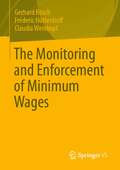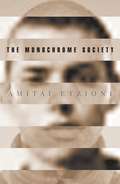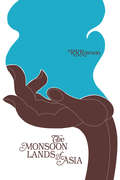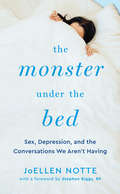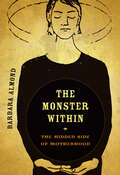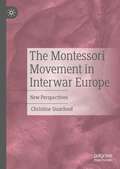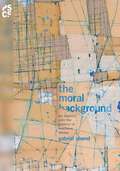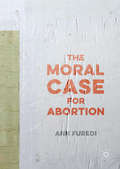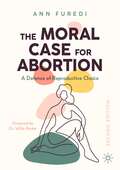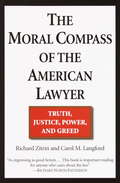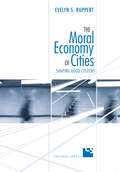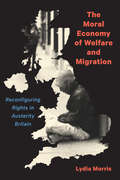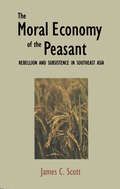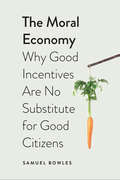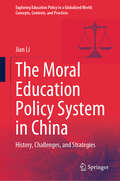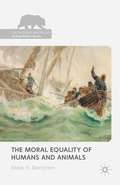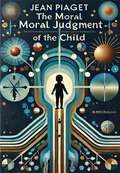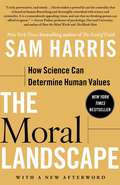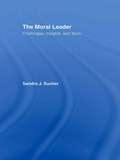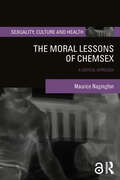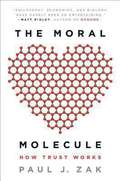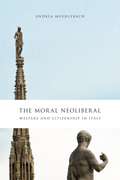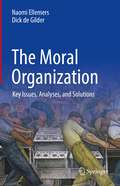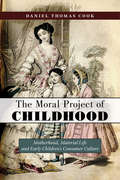- Table View
- List View
The Monied Metropolis: New York City and the Consolidation of the American Bourgeoisie, 1850-1896
by Sven BeckertTracing the shifting fortunes and changing character of New York City's economic elite over half a century, Sven Beckert brings to light a neglected--and critical--chapter in the social history of the U. S. : the rise of an American bourgeoisie. The Monied Metropolis is the first comprehensive history of New York's economic elite, the most powerful group in nineteenth-century America. Beckert explains how a small and diverse group of New Yorkers came to wield unprecedented economic, social, and political power from 1850 to the turn of the twentieth century. He reveals the central role of the Civil War in realigning New York's economic elite, and how the New York bourgeoisie reoriented its ideology during Reconstruction, abandoning the free labor views of the antebellum years for laissez-faire liberalism. Sven Beckert is the Dunwalke Associate at Harvard University. He is the recipient of several honors and fellowships, including the Aby Warburg Foundation prize for academic excellence, a MacArthur Dissertation Fellowship and a Andrew W. Mellon fellowship. This is his first book.
The Monitoring and Enforcement of Minimum Wages
by Gerhard Bosch Frederic Hüttenhoff Claudia WeinkopfThe book presents the results of the first comprehensive empirical study on the control of minimum wages in Germany. It offers an overview of the challenges and problems of enforcement and compliance with minimum wages, taking three sectors as examples (construction, meat industry, hospitality). On the basis of numerous interviews with experts from the field (e.g. trade unions, employers' associations, customs) and a comprehensive evaluation of the broad international research literature, it identifies starting points and strategies for sustainably improving compliance with and enforcement of minimum wages.
The Monochrome Society (New Forum Books #24)
by Amitai EtzioniAmitai Etzioni is one of the most influential social and political thinkers of our day, a man synonymous with the ideas of communitarianism. In this book, Etzioni challenges those who argue that diversity or multiculturalism is about to become the governing American creed. On the surface, America may seem like a fractured mosaic, but the country is in reality far more socially monochromatic and united than most observers have claimed. In the first chapter, Etzioni presents a great deal of evidence that Americans, whites and African Americans, Hispanics and Asian Americans, new immigrants and decedents of the Pilgrims, continue to share the same core of basic American values and aspirations. He goes on to show that we need not merely a civil but also a good society, one that nurtures virtues. He assesses key social institutions that can serve such a society ranging from revived holidays to greater reliance on public shaming. The most effective sources of bonding and of shared ideas about virtue, he insists throughout, come from the community, not from the state. Etzioni also challenges moral relativists who argue that we have no right to "impose" our moral values on other societies. He responds to those who fear that a cohesive community must also be one that is oppressive, authoritarian, and exclusive. And he explores and assesses possible new sources and definitions of community, including computer-mediated communities and stakeholding in corporations. By turns provocative and reassuring, the chapters here cut to the heart of several of our most pressing social and political issues. The book is further evidence of Etzioni's enduring place in contemporary thought.
The Monsoon Lands of Asia
by Gadi BenEzerAccording to the author a geographic region must satisfy the following conditions: however striking the diversity of the physical setting and the languages, religions and general appearance of the people, there must be some aspect of culture (for example, the social outlook or the organization of the economy) which pervades the area in such a way as to justify the recognition and study of that area as one entity and there must be substantial cultural differences between it and adjacent areas.Monsoon Asia, from Pakistan to Japan is more than a land area and an assemblage of countries: it is a distinctive geographical region. Its population--which includes nearly half the people in the world--is mainly rural, its economy mainly agricultural, and its peoples share a heritage of material poverty. But change is apparent everywhere in the area. This book is a compact and lucid introduction to the dynamic as well as the unchanging characteristics of the region.After an introductory section, which defines the limits of Monsoon Asia, there follow chapters on structure and relief, climate, vegetation, and soils. A discussion of the historical geography of the region leads into studies of its agriculture and industry. The concluding two-thirds of the book survey the characteristics of the constituent countries--India, Pakistan, Ceylon, China, Japan, Korea, and South-East Asia proper (Burma, Malaya, Thailand, Indonesia, the Philippines, etc.).Special attention is paid throughout to the political and social setting of current political problems. The book contains 17 plates, 48 maps and diagrams, a selected bibliography, and an index.
The Monster Under the Bed: Sex, Depression, and the Conversations We Aren't Having
by JoEllen NotteAlmost everyone has had some interaction with depression. Whether it's you, a family member, a friend, or a partner who is affected, depression has the potential to touch us all. Even so, many of us don't know how to handle depression becoming part of our love life and it can quickly become the monster under the bed. From "you have to love yourself first," to "don't stick it in the crazy," to dead silence, popular responses to the topic leave much to be desired. But you're not alone and you can have successful relationships and satisfying sex with depression. JoEllen Notte will help you understand how sexual function is affected by depression and what keeps us from effectively addressing it. Heavily informed by the author's research, including surveys of over 1,000 people and interviews with close to 200, this is the first book of its kind. With practical tips and real-life examples, this is both a guidebook for people with depression and the people who love them, as well as a reference tool for mental health professionals.
The Monster Within: The Hidden Side of Motherhood
by Barbara AlmondMixed feelings about motherhood—uncertainty over having a child, fears of pregnancy and childbirth, or negative thoughts about one’s own children—are not just hard to discuss, they are a powerful social taboo. In this beautifully written book, Barbara Almond brings this troubling issue to light. She uncovers the roots of ambivalence, tells how it manifests in lives of women and their children, and describes a spectrum of maternal behavior—from normal feelings to highly disturbed mothering. In a society where perfection in parenting is the unattainable ideal, this compassionate book also shows how women can affect positive change in their lives.
The Montessori Movement in Interwar Europe: New Perspectives
by Christine QuarfoodThis book explores how the Montessori movement developed a cultural critique and gained momentum during the interwar years of political turbulence. Drawing on archival sources, press material and Montessori's literary output, the book provides a multifaceted analysis of this significant educational movement. The first two chapters presents the scientific background, how Montessori's innovative method offered new solutions to age-old problems of teacher-pupil interaction. The following chapters focus on the social and psycho-pedagogical aspects of Montessorism, and how the movement's culture-critical message about the child's liberation was received and reinterpreted in the wider European public debate. The last four chapters shed new light on the politicisation of Italian Montessorism during the problematic Montessori-Mussolini alliance, 1924-1934.
The Moral Background: An Inquiry into the History of Business Ethics (Princeton Studies in Cultural Sociology #60)
by Gabriel AbendIn recent years, many disciplines have become interested in the scientific study of morality. However, a conceptual framework for this work is still lacking. In The Moral Background, Gabriel Abend develops just such a framework and uses it to investigate the history of business ethics in the United States from the 1850s to the 1930s.According to Abend, morality consists of three levels: moral and immoral behavior, or the behavioral level; moral understandings and norms, or the normative level; and the moral background, which includes what moral concepts exist in a society, what moral methods can be used, what reasons can be given, and what objects can be morally evaluated at all. This background underlies the behavioral and normative levels; it supports, facilitates, and enables them.Through this perspective, Abend historically examines the work of numerous business ethicists and organizations—such as Protestant ministers, business associations, and business schools—and identifies two types of moral background. "Standards of Practice" is characterized by its scientific worldview, moral relativism, and emphasis on individuals' actions and decisions. The "Christian Merchant" type is characterized by its Christian worldview, moral objectivism, and conception of a person's life as a unity.The Moral Background offers both an original account of the history of business ethics and a novel framework for understanding and investigating morality in general.
The Moral Case for Abortion
by Ann FurediThis thought-provoking book sets out the ethical arguments for a woman’s right to choose. Drawing on the traditions of sociological thinking and moral philosophy, it maintains that there is a strong moral case for recognizing autonomy in personal decision-making about reproductive intentions. More than this, it argues that to prevent a woman from making her own choice to continue or end her pregnancy is to undermine the essence of her humanity. The author, a provider of abortion services in the UK, asserts that true respect for human life and true regard for individual conscience demand that we respect a woman’s right to decide, and that support for a woman’s right to a termination has moral foundations and ethical integrity. This fresh perspective on abortion will interest both pro- and anti-choice individuals and organizations, along with academics in the fields of gender studies, philosophy, ethics and religion.
The Moral Case for Abortion: A Defence of Reproductive Choice
by Ann FurediThis revised and updated edition of the 2016 bestselling work sets out the moral arguments for a woman’s right to decide the future of her pregnancy. Drawing on traditions of philosophical and sociological thinking, it presents the case for recognizing autonomy in personal, private decision-making about reproductive intentions. Further, it argues that to prevent a woman making this decision according to her own values is to undermine the essence of her humanity. The author explores how true respect for human life and regard for individual conscience demands that we support a woman’s right to decide, and that support for her right to terminate her pregnancy has moral foundations and ethical integrity. This second edition features a foreword by US abortion provider and reproductive justice advocate Dr. Willie Parker, as well as additional chapters that consider the rights of doctors and nurses to withdraw from abortion provision on grounds of conscience. Furedi also surveys the rapidly changing landscape of the abortion debate, including the rights of women in the aftermath of Trump's presidency; debates, politics and religion in Northern Ireland and the Republic of Ireland; and the differing levels of provision across Europe.
The Moral Compass of the American Lawyer
by Richard A. Zitrin Carol M. LangfordThese are perilous times for Americans who need access to the legal system. Too many lawyers blatantly abuse power and trust, engage in reckless ethical misconduct, grossly unjust billing practices, and dishonesty disguised as client protection. All this has undermined the credibility of lawyers and the authority of the legal system. In the court of public opinion, many lawyers these days are guiltier than the criminals or giant corporations they defend.Is the public right? In this eye-opening, incisive book, Richard Zitrin and Carol Langford, two practicing lawyers and distinguished law professors, shine a penetrating light on the question everyone is asking: Why do lawyers behave the way they do? All across the country, lawyers view certain behavior as "ethical" while average citizens judge that same conduct "immoral." Now, with expert analysis of actual cases ranging from murder to class action suits, Zitrin and Langford investigate lawyers' behavior and its impact on our legal system. The result is a stunningly clear-eyed exploration of law as it is practiced in America today--and a cogent, groundbreaking program for legal reform.From the Trade Paperback edition.
The Moral Economy of Cities
by Evelyn S. RuppertWhat makes a good city? This question has long preoccupied groups interested and involved in the making and remaking of city spaces. In The Moral Economy of Cities, Evelyn S. Ruppert contends that the vision of the 'good city' embraced by professionals in the business of city making recognizes the interests of a dominant public, namely middle class consumers, office workers, tourists, and families. This vision stigmatizes certain members of the public like street youth, panhandlers, discount- and low-income shoppers, and the language used to extol the virtues of the good city inherently moralizes social conduct in the city.Using the redevelopment of the Yonge-Dundas intersection in downtown Toronto in the mid-1990s as a case study, Ruppert examines the language of planners, urban designers, architects, and marketing analysts to reveal the extent to which moralization legitimizes these professions in the public eye and buttresses the very projects they produce. Ruppert's conclusion that economic practices are not free from moral investment encourages the considerable task of re-examining the implications of city planning and development worldwide. The Moral Economy of Cities is mandatory reading for urban studies scholars and practitioners, and their critics. Disclaimer: Images removed at the request of the rights holder
The Moral Economy of Welfare and Migration: Reconfiguring Rights in Austerity Britain
by Lydia MorrisBritain's coalition government of 2010–2015 ushered in an enduring age of austerity and a "moral mission" of welfare reform as part of a drive for deficit reduction. Stricter controls were applied to both domestic welfare and international migration and asylum, which were presented as two sides of the same coin. Policy in both areas has engaged a moral message of earned entitlement and invites a sociological approach that examines such policies in combination, alongside their underpinning moral economy.Exploring the idea of a moral economy – from its original focus on popular rebellion at the rising price of corn to more contemporary analysis of measures that seek to impose moral values from above – Lydia Morris examines Britain's reconfigured pattern of rights in the fields of domestic welfare and migration. Those in power have claimed that heightened conditions and sanctions for the benefit-dependent domestic population, both in and out of work, will promote labour market change and reduce demand for low-skilled migrant workers, often EU citizens, whose own access to benefits was curtailed prior to Brexit. Morris traces related political discourse through to the design and implementation of concrete policy measures and maps the diminished access to rights that has emerged, paying particular attention to the boundaries drawn in defining target groups, and the resistance this has provoked.The Moral Economy of Welfare and Migration considers the topology of the whole system to highlight cross-cutting devices of control that have far-reaching implications for how we are governed as a total population.
The Moral Economy of the Peasant
by James C. ScottJames C. Scott places the critical problem of the peasant household-subsistence-at the center of this study. The fear of food shortages, he argues persuasively, explains many otherwise puzzling technical, social, and moral arrangements in peasant society, such as resistance to innovation, the desire to own land even at some cost in terms of income, relationships with other people, and relationships with institutions, including the state.Once the centrality of the subsistence problem is recognized, its effects on notions of economic and political justice can also be seen. Scott draws from the history of agrarian society in lower Burma and Vietnam to show how the transformations of the colonial era systematically violated the peasants' "moral economy" and created a situation of potential rebellion and revolution.Demonstrating keen insights into the behavior of people in other cultures and a rare ability to generalize soundly from case studies, Scott offers a different perspective on peasant behavior that will be of interest particularly to political scientists, anthropologists, sociologists, and Southeast Asianists."The book is extraordinarily original and valuable and will have a very broad appeal. I think the central thesis is correct and compelling."-Clifford Geertz "In this major work, ... Scott views peasants as political and moral actors defending their values as well as their individual security, making his book vital to an understanding of peasant politics."-Library Journal James C. Scott is professor of political science at Yale University.
The Moral Economy: Why Good Incentives Are No Substitute for Good Citizens
by Samuel BowlesShould the idea of economic man--the amoral and self-interested Homo economicus--determine how we expect people to respond to monetary rewards, punishments, and other incentives? Samuel Bowles answers with a resounding "no. " Policies that follow from this paradigm, he shows, may "crowd out" ethical and generous motives and thus backfire. But incentives per se are not really the culprit. Bowles shows that crowding out occurs when the message conveyed by fines and rewards is that self-interest is expected, that the employer thinks the workforce is lazy, or that the citizen cannot otherwise be trusted to contribute to the public good. Using historical and recent case studies as well as behavioral experiments, Bowles shows how well-designed incentives can crowd in the civic motives on which good governance depends.
The Moral Education Policy System in China: History, Challenges, and Strategies (Exploring Education Policy in a Globalized World: Concepts, Contexts, and Practices)
by Jian LiThis book examines the moral education policy system in China, discussing the challenges of promoting moral education policy in the country, and proposes relative strategies. It explores the moral education policy in China from various perspectives, including in preschool education, primary education, higher education, vocational type-based higher education, secondary vocational education, English education, music education, classroom teaching, citizenship education, and Chinese language education. This book serves as a guide for scholars and researchers who are interested, and work in, research on moral education policy in China, administrators, stakeholders in China's education system, and graduate students who major or minor in the field of moral education policy in China.
The Moral Equality of Humans and Animals (The Palgrave Macmillan Animal Ethics Series)
by Mark H BernsteinReceived opinion has it that humans are morally superior to non-human animals; human interests matter more than the like interests of animals and the value of human lives is alleged to be greater than the value of nonhuman animal lives. Since this belief causes mayhem and murder, its de-mythologizing requires urgent attention.
The Moral Judgment of the Child
by Jean Piaget"The Moral Judgment of the Child" by Jean Piaget is a seminal work in the field of developmental psychology, offering profound insights into how children develop moral reasoning. Piaget, a pioneering psychologist, meticulously examines the stages of moral development from early childhood through adolescence, providing a comprehensive framework for understanding how children distinguish right from wrong.In this influential book, Piaget presents his groundbreaking research based on extensive observations and interviews with children. He explores how children's moral thinking evolves, focusing on the transition from a heteronomous morality, where rules are imposed by authority figures and viewed as unchangeable, to an autonomous morality, where children develop their own sense of justice and fairness based on mutual respect and cooperation.Piaget identifies key factors that influence moral development, such as peer interactions, play, and the child's growing cognitive abilities. He delves into the concepts of intention and consequence, illustrating how children's understanding of these aspects shifts with age and experience. Through detailed case studies and examples, Piaget demonstrates the complexity and variability of moral judgment across different developmental stages."The Moral Judgment of the Child" challenges traditional views of moral development, emphasizing the active role of the child in constructing moral understanding through social interactions and cognitive growth. Piaget's theory has profound implications for education, parenting, and our broader understanding of human development.This book is an essential resource for psychologists, educators, and anyone interested in the intricacies of moral development. Piaget's clear and engaging writing makes complex concepts accessible, while his rigorous research provides a solid foundation for further study. "The Moral Judgment of the Child" remains a cornerstone in developmental psychology, offering timeless insights into the moral lives of children.
The Moral Landscape: How Science Can Determine Human Values
by Sam HarrisNew York Times bestselling author Sam Harris&’s first book, The End of Faith, ignited a worldwide debate about the validity of religion. In the aftermath, Harris discovered that most people—from religious fundamentalists to non-believing scientists—agree on one point: science has nothing to say on the subject of human values. Indeed, our failure to address questions of meaning and morality through science has now become the primary justification for religious faith.In this highly controversial book, Sam Harris seeks to link morality to the rest of human knowledge. Defining morality in terms of human and animal well-being, Harris argues that science can do more than tell how we are; it can, in principle, tell us how we ought to be. In his view, moral relativism is simply false—and comes at an increasing cost to humanity. And the intrusions of religion into the sphere of human values can be finally repelled: for just as there is no such thing as Christian physics or Muslim algebra, there can be no Christian or Muslim morality. Using his expertise in philosophy and neuroscience, along with his experience on the front lines of our “culture wars,” Harris delivers a game-changing book about the future of science and about the real basis of human cooperation.
The Moral Leader: Challenges, Tools and Insights
by Sandra J. SucherSuccessful leaders – at any level and in any arena – are inevitably presented with moral and ethical choices. This unique and innovative textbook is designed to encourage students and managers to confront those fundamental moral challenges, to develop skills in moral analysis and judgment, and to come to terms with their own definition of moral leadership and how it can be translated into action. Drawing on the inspiration of major literary and historical figures such as Machiavelli, Conrad, Shackleton and Achebe, and based upon an impressive array of literary sources, including novels, plays, history and biography, the book centers on four questions implicitly asked of all leaders: What is the nature of a moral challenge? How do people 'reason morally'? How do leaders contend with the moral choices they face? How is moral leadership different from leadership in general? The Moral Leader is based upon the renowned course of the same name taught at Harvard Business School for over two decades. With an emphasis on decision-making and action, students learn to identify moral problems, to address them systematically, and to develop skills that aid them throughout their studies and their professional lives. At times challenging, insightful, and always illuminating, this book is essential reading for all serious students of leadership, management, business ethics or policy. Visit the companion website at www.routledge.com/textbooks/9780415400640
The Moral Lessons of Chemsex: A Critical Approach (Sexuality, Culture and Health)
by Maurice NagingtonThis book explores how gay and bi men’s lived experiences of chemsex intersect with its cultural representations. It argues that while normative moral frameworks are often used to talk about chemsex, chemsex sub-cultures contain their own valuable moral frameworks that can provide lessons about some of the most pressing concerns of contemporary society.Drawing from a tradition of scholarship that views queer sub-cultures as having pedagogical value for all of society, Maurice Nagington critiques norms that govern lives in relation to: the interactions of bodies, sex and capitalism, trauma and tragedy, the regulation of boundaries, and the disciplinary apparatuses in modern society. Each chapter takes its lead from themes informed by the analysis of longitudinal interviews conducted over a two-year period by the author and an archive of materials concerning chemsex such as films, soundtracks, health promotion pamphlets, newspaper articles, blogs, and ethnographic field notes. Linking the accounts of interviewees to wider debates about and representations of chemsex, this innovative book develops a cohesive narrative about the moral lessons chemsex can teach us.Contributing to the emerging field of critical chemsex studies, this volume is of interest to advanced students and scholars interested in gender and sexuality studies, sociology of health and illness, medical anthropology, critical public health and criminology, as well those who are involved in chemsex and wish to read and reflect about it as more than just a problem. The Open Access version of this book, available at http://www.taylorfrancis.com, has been made available under a Creative Commons [Attribution-Non Commercial-No Derivatives (CC-BY-NC-ND)] 4.0 license.
The Moral Molecule: The Source of Love and Prosperity
by Paul J. ZakA Revolution in the Science of Good and EvilWhy do some people give freely while others are cold hearted?Why do some people cheat and steal while others you can trust with your life?Why are some husbands more faithful than others—and why do women tend to be more generous than men?Could they key to moral behavior lie with a single molecule?From the bucolic English countryside to the highlands of Papua New Guinea, from labs in Switzerland to his campus in Souther California, Dr. Paul Zak recounts his extraordinary stories and sets out, for the first time, his revolutionary theory of moral behavior. Accessible and electrifying, The Moral Molecule reveals nothing less than the origins of our most human qualities—empathy, happiness, and the kindness of strangers. .
The Moral Neoliberal: Welfare and Citizenship in Italy
by Andrea MuehlebachMorality is often imagined to be at odds with capitalism and its focus on the bottom line, but in The Moral Neoliberal morality is shown as the opposite: an indispensible tool for capitalist transformation. Set within the shifting landscape of neoliberal welfare reform in the Lombardy region of Italy, Andrea Muehlebach tracks the phenomenal rise of voluntarism in the wake of the state’s withdrawal of social service programs. Using anthropological tools, she shows how socialist volunteers are interpreting their unwaged labor as an expression of social solidarity, with Catholic volunteers thinking of theirs as an expression of charity and love. Such interpretations pave the way for a mass mobilization of an ethical citizenry that is put to work by the state. Visiting several sites across the region, from Milanese high schools to the offices of state social workers to the homes of the needy, Muehlebach mounts a powerful argument that the neoliberal state nurtures selflessness in order to cement some of its most controversial reforms. At the same time, she also shows how the insertion of such an anticapitalist narrative into the heart of neoliberalization can have unintended consequences.
The Moral Organization: Key Issues, Analyses, and Solutions
by Naomi Ellemers Dick de GilderInvestors, customers and employees increasingly expect organizations to take responsibility for the social impact of their activities. This book applies theory and research on moral psychology and social identity, to offer a new perspective on organizational social responsibility and business ethics. The authors use their unique approach to highlight recurring moral challenges in organizational behavior, such as leadership, work motivation, diversity, organizational change and stakeholder relations. Their analysis explains that people are reluctant to acknowledge and confront moral flaws in their workplace behavior, because this constitutes a source of identity threat. Common strategies to cope with this threat invite justifications and symbolic actions – and prevent moral improvement. Each chapter draws together a wealth of research findings and organizational cases. These not only identify and clarify common moral pitfalls, but also show ways to enhance the likelihood that organizations acquire the knowledge, willingness and ability to build an ethical work climate.
The Moral Project of Childhood: Motherhood, Material Life, and Early Children's Consumer Culture
by Daniel Thomas CookExamines the Protestant origins of motherhood and the child consumer Throughout history, the responsibility for children’s moral well-being has fallen into the laps of mothers. In The Moral Project of Childhood, the noted childhood studies scholar Daniel Thomas Cook illustrates how mothers in the nineteenth-century United States meticulously managed their children’s needs and wants, pleasures and pains, through the material world so as to produce the “child” as a moral project. Drawing on a century of religiously-oriented child care advice in women’s periodicals, he examines how children ultimately came to be understood by mothers—and later, by commercial actors—as consumers. From concerns about taste, to forms of discipline and punishment, to play and toys, Cook delves into the social politics of motherhood, historical anxieties about childhood, and early children’s consumer culture. An engaging read, The Moral Project of Childhood provides a rich cultural history of childhood.

